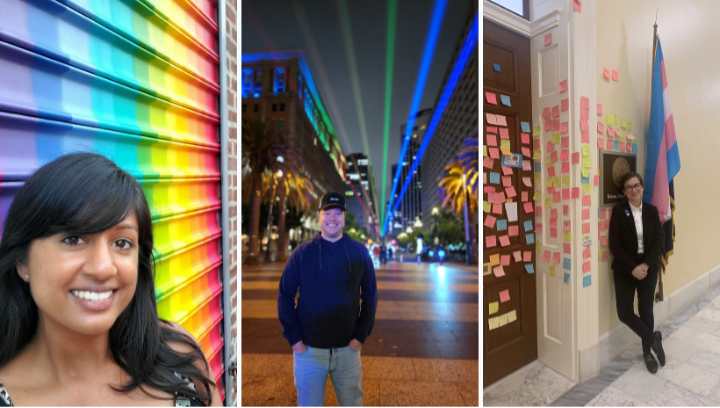IIE celebrates the experiences and perspectives the LGBTQIA+ community brings to international education. We believe that everyone has a right to accessible educational opportunities in a welcoming setting. The first Lesbian, Gay, Bisexual, Transgender, and Queer Pride (LGBTQ+) march dates to June 28, 1970, when members of New York City’s LGBTQ+ community led a one-year commemoration of the Stonewall Inn uprising; the uprising is widely recognized as the start of the movement to resist discrimination against LGBTQ+ Americans. Today, Pride marches take place in many cities across the globe with the purpose of bringing visibility and empowerment to LGBTQ+ communities.
In recognition of Pride Month 2024, we are amplifying the perspectives of IIE’s LGBTQIA+ affinity group members, asking them to reflect on how international education has enriched their lives, which impacts they’d like to see higher education bring about among LGBTQIA+ communities, and recommendations for others seeking to learn more about Pride Month.
Jen Bhiro (she/her), IIE Chicago
(photographed far left)
How has international education enriched your life personally and professionally?
Immersing myself in another culture has opened my mind to the multiplicity of experiences and perspectives in the world and has helped me understand that there isn’t “one right way.” I find myself more accepting of differences as a result.
What book/documentary/exhibit could you recommend to those looking to learn more and/or celebrate Pride Month?
I would recommend learning more about Marsha P. Johnson and the Stonewall Uprising. There are many documentaries (some free!), exhibits, and books to choose from. You can also check out the GLAAD Media Awards for more recommendations.
Casey Bulen (he/him), IIE San Francisco
(photographed at center)
What impacts would you like to see higher education bring among LGBTQIA+ communities?
College was the setting where I began to understand my own identity and navigate what being a gay man meant for me. The programs, community, and support structures that I needed weren’t available, visible, or accessible. I never saw international exchange programs as safe for somebody that was queer because of the perception of how queer communities are treated around the world and the lack of information about how my identity would impact me during an exchange program.
I chose to have a career in higher education and international exchange largely to create environments where these opportunities were accessible, safe, and supportive of queer participants and communities around the world. My dream is to see international exchange programs that can openly engage queer participants, allow them to be authentic during the journey, and help empower queer communities globally.
What stands out to you about your experience as an LGBTQIA+ employee at IIE?
IIE has been the first organization that I’ve worked at where I can be open and authentic about my identity on my terms. Over the past seven years at IIE, I’ve seen a lot of growth in DEIA representation and an acceptance of the work to be done in the company’s approach to welcoming, developing, and supporting diverse team members. Participating with the LGBTQIA+ affinity group has expanded my connections with other queer team members across our offices and provided a community that can openly engage on challenges that are unique to our own experiences and a support network that helps to navigate those challenges when they arise. This network helps us to be better team members in our own roles, create safe environments for new team members to engage with, and advocate for IIE to continue growing in their support for team members of diverse identities in our daily work.
Alex Iadanza (they/them), IIE Washington, D.C.
(photographed far right)
How has international education enriched your life personally and professionally?
International education has enriched my life personally by introducing me to new ways of understanding queer community and culture. In 2019, I studied abroad in Amsterdam as a Gilman Scholarship recipient. While I was out and open regarding my sexuality at the time, I was closeted in my identity as a non-binary person. The accepting and inclusive culture of the Netherlands and the friendships I formed with other trans and non-binary students helped to bolster my confidence and acceptance of my own identity.
What impacts would you like to see higher education bring about among LGBTQIA+ communities?
The role and responsibility of higher education goes beyond just educating. To foster genuine inclusion, higher education must create opportunities for LGBTQ+ students, professors, and staff to thrive, such as in the recruiting and mentoring of LGBTQ+ students, scholars, and staff. Additionally, higher education institutions and organizations should advocate for trans and non-binary inclusive systems and facilities, such as accessible all-gender bathrooms and IT systems that allow a seamless input of pronouns and chosen names.
What book/documentary/exhibit could you recommend to those looking to learn more and/or celebrate Pride Month?
I would recommend the ACLU “At Liberty” podcast’s The Century-Long Fight Over Transgender Youth episode. For a more comprehensive read, I would say try Susan Stryker’s “Transgender History.”
At IIE, we believe that diversity, equity, inclusion, and access (DEIA) are critically important to engaging thoughtfully with the world and remain deeply committed to these principles. IIE’s LGBTQ+ affinity group is comprised of IIE team members in various IIE office locations. The affinity groups are a key part of IIE’s people-driven approach to pursuing and advancing its DEIA Commitment. There are five groups in addition to the LGBTQIA+; they are Asian and Pacific Islander Heritage; Black Heritage, Dis/Ability and Accessibility, Hispanic and Latinx Heritage, and Mental Health and Wellbeing affinity groups.
